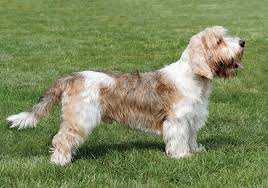
Grand Basset Griffon Vendéen
Conditions of detention
The Grand Basset Griffon Vendéen is best suited for homes with ample space and access to outdoor areas. They thrive in rural or suburban environments where they can exercise freely.
Useful Fact: Due to their high energy levels and strong hunting instincts, they require regular physical activity and mental stimulation.
Nutrition and diet
A balanced diet rich in high-quality proteins, fats, and essential nutrients is crucial. High-quality commercial dog food or a well-planned homemade diet can meet their nutritional needs.
Useful Fact: Regular feeding schedules and portion control help prevent obesity, which is essential for their overall health and joint protection.
Health
The Grand Basset Griffon Vendéen is generally healthy but can be prone to hip dysplasia, ear infections, and certain genetic conditions.
Useful Fact: Regular veterinary check-ups and maintaining a healthy weight can help prevent many common health issues.
Grooming and care
They have a rough, medium-length coat that requires regular brushing to prevent matting and remove loose hair. Their coat colors include white with orange, black, or gray markings.
Useful Fact: Regular ear checks and cleanings are important due to their floppy ears, which can be prone to infections.
Education and training
GBGVs are intelligent but can be independent and sometimes stubborn. Consistent, positive reinforcement methods work best.
Useful Fact: Early socialization and obedience training are essential to harness their hunting instincts and ensure good behavior.
Toys and entertainment
Interactive toys, puzzle feeders, and games that involve scent-tracking are ideal for keeping them mentally and physically engaged.
Useful Fact: Activities that tap into their natural hunting abilities, such as scent work and tracking games, can help keep them stimulated and satisfied.
Safety
Ensure a secure, fenced yard to prevent them from wandering off during their explorations.
Useful Fact: Due to their strong prey drive, they should always be supervised around small animals and in open areas without fences.
Accessories
A sturdy collar, leash, and harness are essential for daily walks. Consider using a GPS tracker for off-leash activities.
Useful Fact: Durable accessories are important to withstand their active lifestyle and strength.
Socialization
Expose them to various people, environments, and other animals from a young age to build confidence and good behavior.
Useful Fact: Regular socialization helps mitigate potential aggression and ensures they become well-adjusted adults.
Travel and Transportation
The GBGV can adapt to travel but needs a secure crate or harness in vehicles for safety.
Useful Fact: Plan regular breaks during long trips to allow them to exercise and relieve themselves.
Behavior and psychology
GBGVs are energetic, intelligent, and loyal. They require consistent leadership and mental stimulation to stay well-behaved and happy.
Useful Fact: Without proper exercise and mental challenges, they can develop behavioral issues such as anxiety and destructiveness.
Legal aspects
Ensure compliance with local laws regarding dog ownership, including licensing, leash laws, and breed-specific regulations.
Useful Fact: Some areas may have specific regulations for hunting dogs, so check local requirements before acquiring one.


